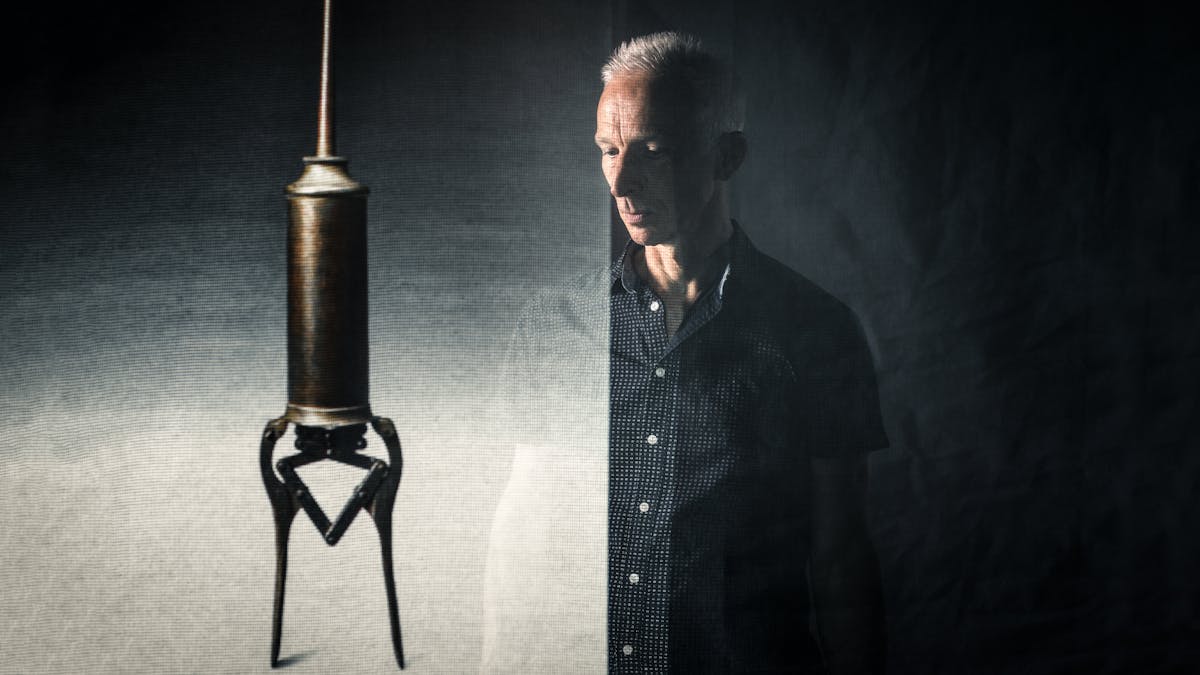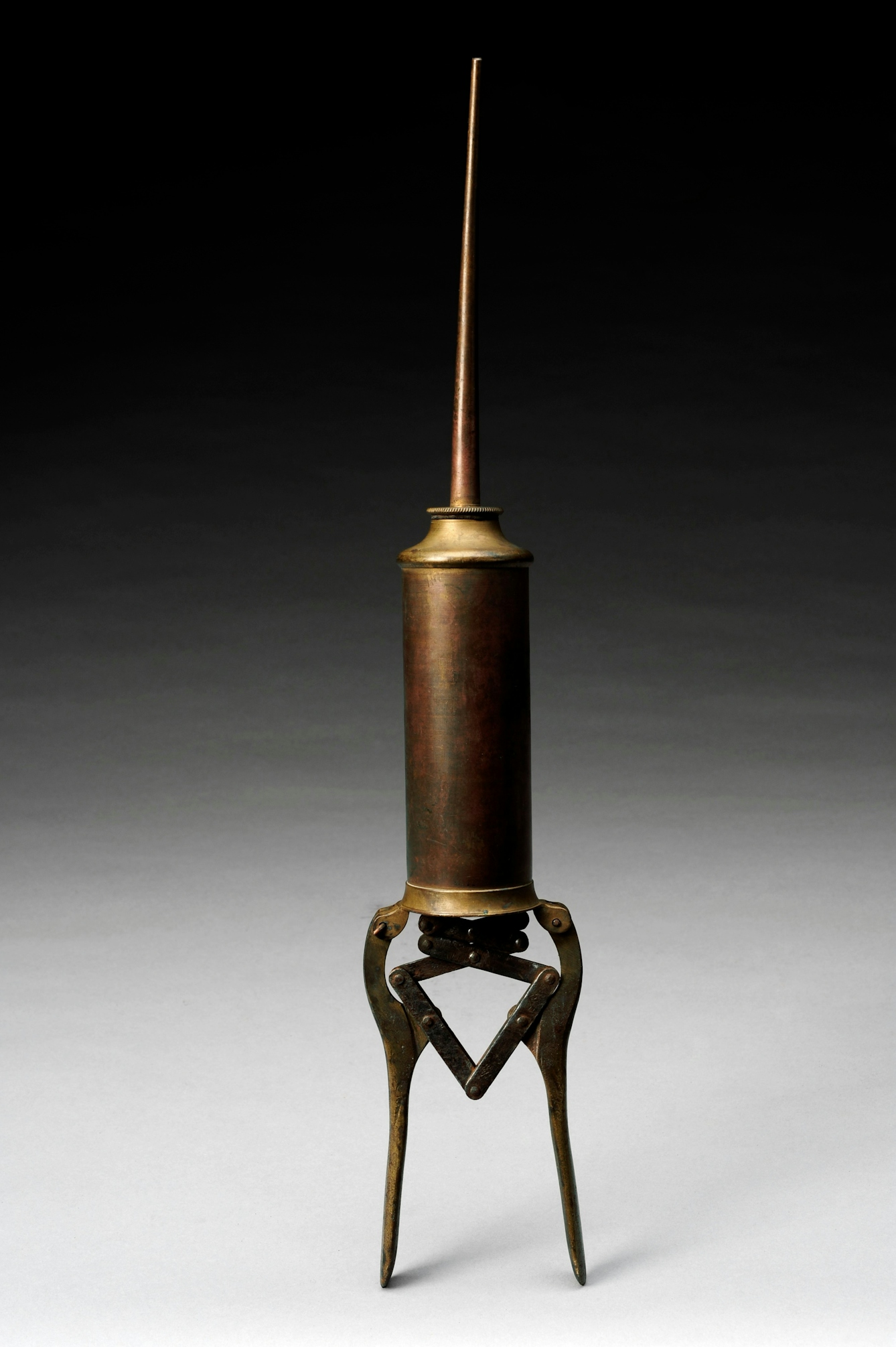An image of a fearsome-looking enema syringe reawakened memories of self-imposed isolation for novelist Rupert Thomson. Here he analyses what prompted a period of unusual behaviour during his student days.
The blood notebooks
Words by Rupert Thomsonaverage reading time 7 minutes
- Article

I’m still not sure what happened to me at the beginning of 1975. I was in my second year at university, taking a course in political philosophy. My tutor was a Rousseau scholar in his early 30s and his quiet intensity and probing gaze made me feel uneasy, inadequate. The first essay I handed in came back covered with sticky marmalade stains and critical remarks regarding my use of language. Clearly, I had embarked on something that was beyond me.
That year, I had been given my own room on the top floor of a student accommodation block inside the college grounds. I had a desk, a chair and a single bed, and just inside the door, near the washbasin, there was a skylight that opened on to the building’s flat roof.
The wide window behind my desk looked eastwards over the rooftops to a green strip in the distance, the place where the city ended and the countryside began. Above it, the big, ever-changing Fenland sky. There was solace in that uncluttered view. I sometimes dreamed about flying from the window, Peter Pan-like, and arriving in that green place.
I spent most days in the university library. I would take my lunch with me – a cheese sandwich, wrapped in greaseproof paper. I found that I was seeing very few people. I was also eating less than I had the previous year.
Instead of having dinner in college, which was what all the other students did, I would make myself a bowl of porridge in the communal kitchen on the top floor of my building. Sometimes I treated myself to a Mars bar. Cups of Nescafé helped to ward off the hunger, but I didn’t mind feeling empty. It kept fatigue at bay and helped me concentrate.
One evening a friend from another college came round for coffee. While in my room, he propositioned me. I had attended a boys’ boarding school where same-sex relationships were the only relationships available and though my schooldays were over and I was now in a world that felt much wider, I had ended up at a university where men outnumbered women by seven to one.
Feeling frustrated and betrayed, I reached for a nearby book – a dictionary, I think – and flung it at my friend. He threw his hands up around his head to protect himself, but the book missed him, thudding against the wall.
A solitary existence
After that, I did my best to live a solitary existence. Before I left my room to make a coffee or some porridge, I would listen at the door, making sure that nobody was using the kitchen. I didn’t want to see anyone I knew. I didn’t want to see anyone at all.
At some point during that term, a school friend called Barry wrote me a postcard, announcing that he was coming to Cambridge to visit me. I panicked. There was no question of my seeing him. How to avoid him, though, now that he was on his way?
If I wasn’t there when he showed up, he would probably just wait until I returned. Back then, people spent hours waiting for each other. The best strategy, I decided, was to lock myself in my room and pretend to be out.
More: How isolation can make you ill.
On the day of Barry’s proposed arrival I couldn’t settle. Towards five in the afternoon, the knock I had been dreading finally came. I eyed my chair, which I had placed beneath the skylight. If Barry threatened to break down the door, I would escape onto the roof, kicking the chair away so as not to leave any clues as to where I had gone. If he climbed up through the window, I would escape over the rooftops.
“Rupert?”
Barry’s knocking grew louder and more insistent. I felt, oddly, that he could see me through the door.
“You’re in there,” he said. “I know you are.”
What if he went to the Porter’s Lodge and came back with a spare key? What would I do then? I sat on the edge of my bed, my breathing shallow.
“Come on, Rupert. Let me in.”
The knocking continued. As the minutes passed, though, it began to sound despondent, and Barry’s voice became uncomprehending, almost pitiful.
“Why won’t you let me in?”
At last, he gave up, but it was a while before I heard him walk away. Even so, I didn’t dare to leave my room.
I never saw Barry again.

Brass enema syringe, Portugal, 18th century.
Explaining my predicament
It was around that time that I began to suffer from constipation. I would sit on the toilet for minutes on end. Nothing would happen. Sometimes I bent almost double, straining. Still nothing.
One morning I reached back to wipe myself and felt the toilet paper turn wet in my hand. When I looked at it, I was shocked to see that it was soaked with blood – blood that was a vivid, almost technicolour red.
I took the sheets of toilet paper back to my room and placed them inside an old school exercise book, one on each page, the blood acting as glue. On the pale-green front cover I wrote ‘The Blood Notebook’ in capital letters. Every visit to the toilet would produce several sheets of toilet paper, each one less blood-drenched than the last, but there was never a bowel movement.
If Barry threatened to break down the door, I would escape onto the roof, kicking the chair away.
After a week, I began to worry. I made an appointment with a local doctor. At the very least, I would be given an enema, I thought, a prospect I wasn’t looking forward to. I could imagine no other solution, though.
When I appeared at the doctor’s surgery I explained my predicament. He listened patiently, then bent me over a chair and pulled on a rubber glove, warning me that I might feel ‘some discomfort’. Once the examination was over, he stood back, peeling off the glove.
“There’s nothing there,” he said. He seemed puzzled, but also amused, as if he had witnessed something unexpected, even remarkable.
“Nothing?” I murmured. “But it’s been ten days.”
He shrugged, then wrote me a prescription for the bleeding. It is possible that he asked about my diet or offered me advice about nutrition, but I have no memory of that. I also have no memory of when or how my behaviour returned to normal.
In thrall to a process
What had prompted my descent into what now, with hindsight, looks a lot like paranoia? Was it because I had found myself placed once again in an environment that made it virtually impossible to escape male attention? Was it because I felt, for those few weeks, that I was intellectually out of my depth? Was it in part triggered by the shadowy but powerful presence of my tutor, a man I am now grateful to for having changed the way I wrote?
Could it perhaps have been a delayed response to the sudden death of my mother eleven years before, when I was eight? Or was it simply a ‘sophomore slump’, as an American academic friend of mine suggested years later? I don’t know. I have long since lost the blood notebooks – there were, in the end, at least two of them – but I can still see them in my mind’s eye.
At the time it felt as if I were keeping a diary. In thrall to a process, but also standing back, observing it, as one might observe a performance. No words necessary, just a time and a date, and the blood slowly drying on the page.
About the author
Rupert Thomson
British writer Rupert Thomson is the author of 11 novels and a memoir, ‘This Party’s Got to Stop’, which won the Writers’ Guild Non-Fiction Book of the Year in 2010. His most recent novel is ‘Never Anyone But You’, based on the real-life relationship and creative collaboration between artists Marcel Moore and Claude Cahun.
